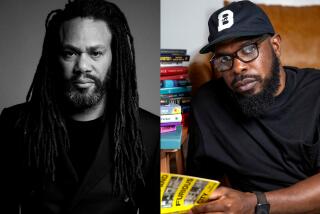Scriptwriting Taught to Those Who Would by Those Who Can
For the past six years, David E. Cameron has carried in his head a dream for a television series called “Clix.” Last weekend, at an $85-a-head UC Irvine Extension seminar for aspiring scriptwriters, Cameron finally learned from a panel of experts of a critical flaw in his plans: no script.
“They unanimously concurred that a script was necessary,” said Cameron, 41, of Irvine. “I had been under the impression I could make it without one.”
Cameron was one of nine men and 18 women who came to UCI on Friday night, admittedly knowing nothing about the way ideas become movies, television programs, novels and plays. Their fee bought them the indulgence of a panel of professional Hollywood types, who listened with patience and apparent interest to their story ideas.
Friday night’s panel included Judy Burns, the co-producer of “Stingray” and a writer for TV shows including “The Bionic Woman”; Karyl Miller, a writer-producer for “My Sister Sam,” a TV comedy; Pat Geary, a fantasy novelist who wrote “Living in Ether,” and playwright Tom Strelich, whose “Dog Logic” was produced last season at South Coast Repertory Theatre in Costa Mesa.
“How many of you are into one-hour episodic?” Burns asked the class after introducing herself. Silence was the reply, as class members were unfamiliar with the television industry’s jargon.
Cameron’s “Clix,” incidentally, is about a roving photojournalist who, with the aid of an American Indian photo assistant/sidekick, travels about the country protecting the environment from unscrupulous businessmen and government agencies. Cameron said he saw his Lone Ranger-esque hero, Boise Hallorhan, as an updated version of the television cowboy.
Cameron himself is a professional photographer, and his idea, like many presented at the class, was a sort of fantastic extrapolation of his own experience. Likewise, a middle-aged woman proposed a novel/screenplay/television “comedy-drama about a young American woman traveling through Europe in search of experiences.” A woman with a Southern accent offered up a premise of a Louisiana Cajun family in the charged days of the populist political boss Huey Long.
Some seemed to cull their proposals from incidents in their lives; others looked at writing as a trade, and at entertainment writing as its most profitable specialty.
“That guy who was just talking, well I just don’t see it that way,” Debra Oliver, 26, of Placentia, said in reference to Stelich’s admonition that aspiring playwrights be content with a modest income.
“People talk about the poverty for the love of it (writing). I just can’t go for that. I’m in this not only for the love of it, but also to make a dollar.”
Oliver, a student at Cal State Fullerton, was something of an oddity in the group, as she is already a published writer: Four years ago, she said, her story “My Sister” was published in Co-ed magazine.
Throughout the evening, the panelists listened to the story ideas, most of which were not developed beyond a single sentence, and made recommendations on how best to pursue them. The panelists concurred that the most important thing to do was to actually write a script based on the idea. Beyond that, they suggested that class participants get to know people who work in the entertainment industry because personal contacts are a key way of getting scripts produced, they said.
Many participants said that they were heartened by the advice of the panel, which was, all in all, that hard work and having friends in the industry would yield a writing career. One factor not mentioned was the concept of talent as a useful thing for an aspiring writer to have.
After the seminar, Burns explained why: “There are a lot of people in my industry who don’t have talent.”
More to Read
The biggest entertainment stories
Get our big stories about Hollywood, film, television, music, arts, culture and more right in your inbox as soon as they publish.
You may occasionally receive promotional content from the Los Angeles Times.










